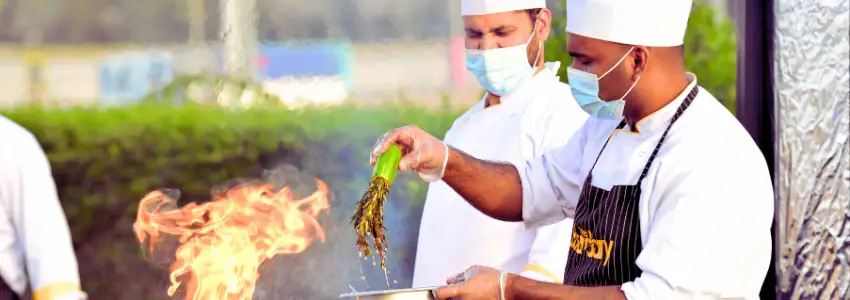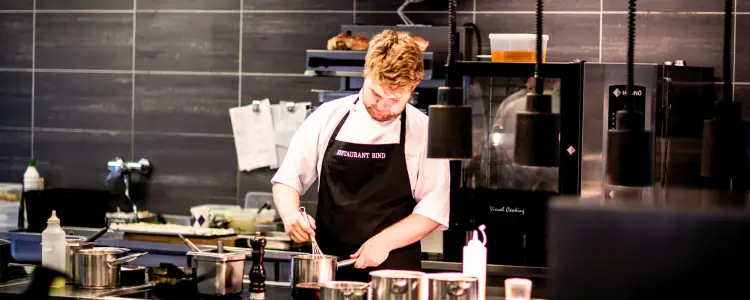An Executive Chef is the top-level chef in a kitchen, generally responsible for overlooking more than 1 kitchen within a group and looking after all kitchen operations. They oversee menu planning, recipe development, and ingredient sourcing, as well as managing the kitchen staff. An Executive Chef is also responsible for the financial performance of the kitchen and must work closely with the restaurant’s management team to ensure that the kitchen is operating efficiently and within budget.
On the other hand, a Head Chef is responsible for the day-to-day running of the kitchen and managing the kitchen staff. They oversee the preparation and cooking of dishes and ensure that all equipment is working correctly. They also train and manage the kitchen staff and ensure that all food is of high quality.
While both roles are essential in a kitchen, an Executive Chef is typically considered to be higher ranking than a Head Chef. This is because the Executive Chef has a broader range of responsibilities, including financial management and menu planning, and they are responsible for the overall success of the restaurant.
In larger restaurants or hotel kitchens, there may be multiple Head Chefs responsible for different areas, such as pastry or seafood. In these cases, an Executive Chef would oversee all Head Chefs and be responsible for coordinating their work and ensuring that the restaurant’s culinary offerings are cohesive.
Ultimately, the hierarchy of chefs in a kitchen depends on the size and complexity of the operation. In a small restaurant, the Head Chef may be the top-level chef, while in a larger operation, an Executive Chef may hold the top position. Regardless of the specific role, all chefs in a kitchen play a crucial part in creating a successful dining experience for guests.

Some of my articles may contain affiliate links, which means I earn a small commission at no extra cost to you but it does help me with the running costs. As an Amazon Associate, I will earn commissions on purchases but this does not affect my reviews on products or services.
Questions and answers
Do executive chefs need qualifications to work in the UK?
Executive chefs are some of the most important figures in the culinary industry, responsible for the overall management and operation of a kitchen. They are in charge of menu planning, recipe development, kitchen staff management, and ensuring that all food preparation meets high-quality standards. In the UK, there are no formal qualifications required to become an executive chef, but there are several paths that aspiring chefs can take to build their skills and gain experience.
One option is to pursue a culinary arts degree from a reputable institution. Many universities and culinary schools offer courses in culinary arts that cover everything from food preparation techniques to menu planning and restaurant management. These programs typically take two to four years to complete and provide students with a broad range of skills and knowledge that are highly valuable in the industry. However, a degree is not a necessity and many top chefs have climbed the ranks through experience alone.
Another option is to gain practical experience through an apprenticeship or entry-level position. Many restaurants and catering companies offer entry-level positions for aspiring chefs where they can learn the basics of food preparation, kitchen management, and customer service. With time and dedication, these entry-level positions can lead to promotions and eventually to executive chef positions. Apprenticeships are also an option and can provide valuable hands-on experience alongside formal training and guidance.
In addition to formal education and practical experience, executive chefs in the UK should have a number of key skills and attributes to be successful. These include excellent culinary skills, strong leadership and management abilities, a creative mindset, a passion for food and hospitality, and the ability to work well under pressure. Additionally, executive chefs should stay up to date with the latest culinary trends and techniques and be able to adapt quickly to changes in the industry.
In conclusion, while there are no formal qualifications required to become an executive chef in the UK, a combination of formal education, practical experience, and key skills and attributes are essential for success in this highly competitive industry.
What is the highest salary of an executive chef?
The salary of an executive chef can vary greatly depending on a number of factors, including the size and type of the restaurant, the location, the chef’s level of experience, and the chef’s reputation. However, according to recent surveys, the highest salaries for executive chefs in the UK can range from £70,000 to £100,000 or more per year.
Executive chefs who work in high-end, fine dining establishments or who are well-known in the industry for their culinary expertise and creativity tend to command higher salaries. Additionally, chefs who manage large teams or who are responsible for multiple locations or concepts can also earn higher salaries.
In general, executive chefs who work in large cities or popular tourist destinations tend to earn more than those in smaller towns or less popular areas. This is because these areas typically have more competition for top culinary talent and higher demand for quality dining experiences.
Other factors that can affect the salary of an executive chef include benefits packages, such as health insurance, retirement plans, and bonuses. Many high-end restaurants and hospitality groups offer generous benefits packages to attract and retain top talent.
It’s important to note that the salary of an executive chef is just one aspect of their compensation package. Many chefs also receive other perks and benefits, such as free meals, opportunities for travel, and access to exclusive events and industry resources.
In conclusion, the highest salary of an executive chef in the UK can vary widely depending on a number of factors but can range from £70,000 to £100,000 or more per year. As with any industry, the most successful and highly regarded chefs tend to earn the highest salaries, but factors such as location, experience, and benefits packages also play a role in determining compensation.
Great chefs knife

What are the cons of being an executive chef?
Being an executive chef can be a rewarding and fulfilling career, but like any job, there are also potential downsides or “cons” to consider. Here are a few possible drawbacks to being an executive chef:
- Long and irregular hours – One of the most common complaints from executive chefs is the long and often irregular hours required to run a restaurant kitchen. Chefs may work early mornings, late nights, and weekends or holidays, and may not have consistent days off. This can make it challenging to maintain a healthy work-life balance and may strain personal relationships.
- High stress and pressure – Running a busy kitchen can be incredibly stressful and demanding. Executive chefs are responsible for managing a team of cooks, ensuring the quality and consistency of dishes, managing inventory and ordering supplies, and dealing with customer complaints or special requests. The fast-paced and high-pressure environment can be overwhelming for some chefs.
- Physical demands – Working in a kitchen can be physically demanding, with chefs on their feet for long periods of time, lifting heavy pots and pans, and working in hot and humid environments. This can lead to injuries or chronic pain over time.
- High turnover and burnout – The restaurant industry has a notoriously high turnover rate, with many cooks and chefs leaving the profession after just a few years. Executive chefs may experience burnout from the demanding workload and high expectations, which can lead to a desire to leave the industry altogether.
- Financial risk – Running a restaurant is a high-risk business, with many factors that can impact profitability. Executive chefs who are also business owners or partners may experience financial stress and risk if the restaurant does not perform as expected.
In conclusion, being an executive chef can be a challenging and demanding career, with potential downsides such as long and irregular hours, high stress and pressure, physical demands, high turnover and burnout, and financial risk. However, for those who are passionate about cooking and hospitality, the rewards of creating delicious dishes and providing memorable dining experiences may outweigh the cons.
Related posts:
- Crackling Pork: The Secret to a Delicious British Sunday Roast

- Discover 10 Favorite Ice Cream Flavors in the UK

- Chichester Canal Boat Ride: Discover the Tranquil Waterway


